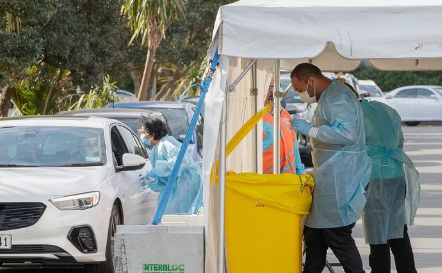
It comes as health officials alert the public that a Covid-positive person visited three busy locations in Auckland last week before they knew they had the virus.
Auckland Regional Public Health says the person visited a Les Mills gym in a mall in Takapuna taken between 5.30pm and 7.30pm on Wednesday, September 9, and one at 9.15am on Thursday, September 10.
They also visited a Countdown supermarket and The Warehouse in Milford between 11am and noon on Thursday.
Health officials said those in the same gym classes close contacts and should isolate and get tested. Others at the gym but not in the same classes are casual contacts and should also be tested.
People who were at the supermarket or The Warehouse are low risk and should monitor for symptoms but do not need to isolate.
The gym has been deep cleaned and is open today.
New Zealand's most populous city stepped down from lockdown alert level 3 to the tailor-made 'alert level 2.5' on August 31, while the rest of the country remains at level 2.
For Auckland, that means social gatherings are restricted to just 10 people - with 50 allowed for funerals and tangihanga - while 100 are allowed in the rest of the country.
Throughout New Zealand people are now required to wear masks when using public transport.
What started as a sub-cluster in an Auckland church widened when it was revealed one member of the congregation had visited a grieving family.
Things were then complicated when it became apparent not all contacts in this sub-cluster had complied with public health requirements.
Yesterday, the Ministry of Health reported one case in managed isolation and another of a health worker in Auckland's Jet Park quarantine facility.
The Government is due to announce its alert level decision this afternoon.

"I think it would be pretty important to see a run of zero days and I think we're not really making proper use of masks in Auckland."
Prof Wilson said masks were the key to any long term containment of the novel coronavirus in Auckland and beyond.
He said the Government should consider extending the requirement to wear them on public transport to all indoor spaces including supermarkets, workplaces and schools.
"I think that's the way to get very high levels of mask use and that would help speed progress. We're seeing progress with the slow decline in the number of cases but to really accelerate that progress we need to make best use of masks."
Prof Wilson said high mask compliance on public transport around the country proved that if people are required to wear masks, they would do so.
The police are yet to issue any fines for people not wearing masks on public transport and have confirmed they're still taking an 'education and encouragement' approach.
ACT leader David Seymour said government messaging around masks has been confusing and must be clarified.
"I think the lack of compliance comes down to the mixed messages about masking. The government needs to be clear: if masking is a way to avoid further restrictions the public will be on side but they have not had that clear message."
While Seymour said government messaging must be clearer there are others who want the health messaging to stop altogether.
RALLY CRITICISED
Several thousand people rallied in Auckland's Aotea Square on Saturday in a protest against the government's use of Covid-19 restrictions. It was organised by Advance Party co-leaders, Jami Lee Ross and Billy Te Kahika.
It's one of several protests to date Auckland mayor Phil Goff said flies in the face of the city's overall response to Covid-19.
"They are letting the side down. They are putting the rest of us at risk. It's a slap in the face for those of us that are doing the right thing to have a small minority of people that think somehow the rules don't apply to them. They're bulletproof and they don't have any part to play in stopping the spread of the virus."
Goff said the city will slide down the alert level scale if Aucklanders can stay the course.
Prof Wilson said he's hopeful the entire country can achieve elimination again.
"We're in a good position as an island nation; we can have good border control and get back to elimination. So these things are all temporary measures to speed us down controlling the Auckland outbreak and eliminating spread in Auckland."












